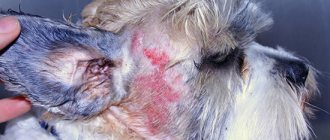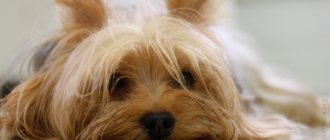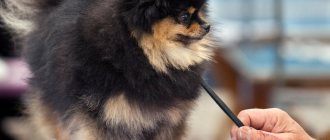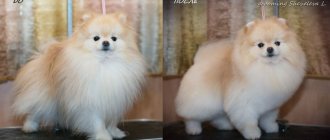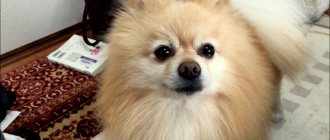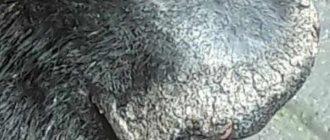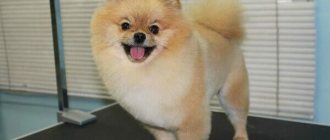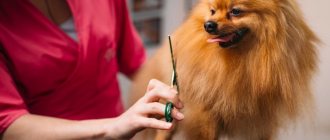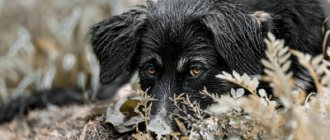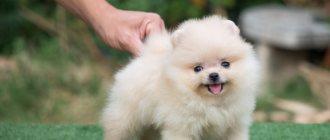The abundance of white scales on the coat not only spoils the appearance, but also signals internal problems. This alarm bell cannot be ignored, since some systemic pathologies can lead to the death of the animal due to associated complications. Symptoms and treatment for dandruff in dogs depend on the cause, so the first step is to make an appointment with your veterinarian.
What is dandruff in a dog?
During cell regeneration, part of the epidermis dies and peels off. This process is accompanied by the formation of small scales resembling fine flour or flakes. If their number gradually increases and affects the quality of the coat, causing baldness and other alarming symptoms, then the pet should be checked for diseases.
What does it look like
Most often, dandruff appears on a dog's back, neck, ears, belly and tail area. It is easy to notice when combing the fur or regular stroking. In addition to the standard white color, 3 more options are possible:
- yellow, accompanying seborrheic dermatitis;
- black, which appears when the functionality of the sebaceous glands is impaired and when blood clots;
- red, characteristic of peeling inflamed skin.
The scales can be dry or greasy to the touch. In the first case, they easily fall off the body, and in the second, they get stuck in the hairs, giving them an unkempt appearance and an unpleasant odor.
What can be confused with
Dying epidermis can be confused with fleas and lice. These parasites have similar sizes, colors and shapes. They can be distinguished due to their mobility.
Small black dots may be traces of coagulated blood that appears at the site of scratches or insect bites. Here it is worth paying attention to the accompanying symptoms. Local hair loss and severe itching are not typical for such cases.
The reasons for the increased formation of dandruff in Spitz may be:
- Hair or subcutaneous mites, fleas;
- Endocrine diseases, hormonal imbalance;
- Fungal, bacterial or viral infections;
- Liver diseases;
- Diabetes;
- Food allergies;
- Oncological diseases.
Do not risk the health, and possibly the life of your pet.
If you find dandruff in your Spitz puppy, immediately show the dog to a specialist. After conducting an examination, the doctor will determine a treatment regimen, or simply give advice on choosing shampoo and vitamins. tagsfight diabetes mite dandruff content
Causes of skin peeling
A negative reaction from the skin is caused not only by internal pathologies, but also by external factors. Peeling can appear at any time of the year, regardless of the length of the coat and the age of the pet.
Despite this, dandruff in a puppy is often caused by unstable functioning of the sebaceous glands. In the absence of pathologies, it goes away on its own after some time.
External factors
This group includes the negative impact of the external environment, excluding internal violations. It is much easier to eliminate such causes, but if treatment is delayed, they can develop into quite serious diseases.
Stress
Four-legged pets have a hard time withstanding even temporary separation from their owner, so a sudden business trip or trip abroad can provoke a disruption in metabolic processes. Particularly nervous animals include decorative breeds that cannot tolerate noisy sounds or the appearance of new family members.
Prolonged nervous tension weakens the immune system and aggravates chronic pathologies. To eliminate it, you need to get rid of irritating factors and take a course of sedatives.
Poor nutrition
Lack of vitamins and consumption of low-quality feed worsen health, immediately affecting the appearance of the skin. Unfiltered tap water can cause similar problems.
For your pet to recover, it is necessary to reconsider its diet in favor of at least premium food or high-quality natural products. Drying and natural water should not be mixed with each other, and water should always be cleaned of harmful compounds and regularly replaced with fresh water.
Parasites
Itching and peeling are caused by ecto- (living directly on the skin) and endoparasites living in tissues and internal organs. These include fleas, lice eaters, ticks and helminths.
Detachment of the epidermis occurs due to constant scratching or intoxication. The listed parasites often carry pathogens of deadly diseases: piroplasmosis, ehrlichiosis, borreliosis, bartonellosis and tick-borne encephalitis.
Improper care
Skin problems often arise from improper combing, blow-drying at maximum power, using aggressive detergents, neglecting hygienic haircuts, and bathing too rarely or too often. To return to a healthy appearance you need to:
- Change the comb to a softer one.
- Use a hair dryer as little as possible and only at minimum power.
- Purchase veterinary shampoos with hypoallergenic properties.
- Trim excess hair regularly.
- Bath your pet only if it is heavily soiled or before a show.
More detailed information about care can be found in the grooming salon. Here you can undergo most procedures, which is suitable for especially busy owners.
Shedding
During seasonal molting, not only hairs are renewed, but also epidermal cells. In this case, the animal’s condition normalizes on its own after some time. Frequent brushing with a furminator will help facilitate coat renewal.
Allergy
Another possible reason is an allergic reaction. It is caused by flea bites, pollen, certain foods, dust and even sunlight. In addition to itching and peeling, the formation of a rash, swelling and inflammation is noted.
The disease is treated with antihistamines and glucocorticosteroids. In case of food allergies, the practice is to switch to a special diet that excludes the most common allergens.
Dry air
Low humidity is typical for the heating season. Not only four-legged pets suffer from dryness and flaking, but also their owners. The situation can be corrected with the help of a moisturizer and emollient ointments.
Internal factors
Internal pathologies disrupt metabolism, causing a lack of microelements throughout the body. This also affects tissue regeneration, which is why a sick dog develops dandruff.
Infections
This group includes bacterial and fungal infections that cause local hair loss and the formation of bald spots. Breeds with folded skin are at risk. With insufficient care, pathogenic microflora develops quite quickly in these areas, attracted by high humidity and dirt.
Dermatitis
Inflammatory lesions of the skin are characteristic of atopic dermatitis, seborrhea, ichthyosis and sebadenitis. Despite similar symptoms, all these diseases require completely different treatments.
Systemic pathologies
Systemic pathologies include hormonal disorders (hypothyroidism, diabetes mellitus, hypo- and vitamin deficiency), diseases of the urinary system (liver and kidneys) and some gastrointestinal disorders (impaired intestinal absorption). All of them lead to incorrect functioning of the sebaceous glands, intoxication of the body and accumulation of metabolic products in the subcutaneous tissue.
LiveInternetLiveInternet
From time to time, the Pomeranian Spitz develops such a problem as dandruff. Some owners believe that there is nothing unsafe in this and the only inconvenience is that from an aesthetic point of view, dandruff looks ugly. But, in fact, everything is much worse and the occurrence of dandruff in a Pomeranian Spitz may indicate that the dog is seriously ill. You should not self-medicate dandruff, since the reasons for its appearance can be very different and the best option would be to take your pet to a veterinarian for examination, because only a qualified specialist will give clear advice on how to get rid of dandruff.
cat dandruff and heavy shedding
In dogs, the cells of the upper layers of the skin often die and are replaced by new ones. This process is completely invisible to the dog owner in this case, if your pet is healthy. But when there are a lot of scales and they are visible on the orange’s fur, then you should sound the alarm, as this indicates that the dog is sick. why do I eat dandruff There is a list of circumstances that cause dandruff in a Pomeranian:
- Stress. anti-dandruff menthol shampoo If your dog has experienced severe stress, then it is entirely possible that he will develop dandruff, and this can happen instantly. Hair loss may also occur.
- Dry skin. dandruff after lice When the heating season begins, the air in the apartment can become very dry, in turn, this can cause dandruff in the orange. But this cause of dandruff is not so serious and not unsafe for the dog.
- Shedding. minoxidil dandruff During the shedding process, Pomeranians may develop dandruff. There is no need to worry, because when the shedding is complete, the dandruff will go away, and the dog’s coat will look luxurious again.
- Food allergies. how to cure dandruff at home watch Often, the cause of dandruff in a Pomeranian can be an allergy caused by various additives contained in dry food. The body of some dogs is very susceptible to dyes, chemical additives, and flavor enhancers - this can cause severe itching in oranges and profuse dandruff. Your dog may also be allergic to a specific food, such as chicken or soy protein.
- Parasites. weight loss diet against dandruff Dandruff in Pomeranians can appear as a result of infection with various parasites that cause severe itching, thereby harming the coat and skin of the Pomeranian.
- Unbalanced diet. dreadlocks dandruff Sometimes the cause of dandruff in oranges can be an unbalanced diet, therefore, a lack of nutrients that would contribute to the normal functioning of the dog’s body.
- Serious illnesses. how to treat dandruff in Pekingese It also happens that the appearance of dandruff can be caused by various diseases, for example, eczema, diabetes, hormonal imbalance or dermatitis.
dandruff at 42 years old
“Dandruff in a Spitz – what to do?” Attentive owners immediately ask this question when they discover this problem in their pet. Of course, the key factor in treating dandruff is to first determine the exact cause of its appearance and correctly prescribe treatment. This is why it is so important to see a veterinarian rather than self-medicate your dog. After all, in some cases you can only do harm. there is large crusty dandruff on the head. We have already identified the main causes of dandruff in Spitz. Now we need to figure out how to deal with them.
medicated shampoos against dandruff and seborrhea
- In this case, if the root cause of dandruff in an orange is the most common dry skin, then all you need to do is comb your pet daily with a soft brush, but after moistening the fur. This way, you get a kind of massage that will promote blood flow to the skin. It is also advisable to wash off dandruff. Buy a quality anti-dandruff shampoo for dogs from a specialty store, but do not bathe your Pomeranian too often. By doing all these procedures, you will begin to notice how the dandruff begins to disappear, and your dog’s coat becomes beautiful and shiny again. On top of that, after consulting with your veterinarian, you can start giving your Pomeranian vitamins, such as The Collagen – Power Balance. This wonderful product will help improve the appearance of the dog’s coat and skin condition, fill the cells with moisture, and also help every organ of the orange to work perfectly.
- If your orange has dandruff during molting, then all you can do is wait until it’s over. During this period, you can also wash your Spitz with special shampoos that reduce the amount of dandruff in the dog. Make sure that shampoos contain salicylic acid. The French preparation Essential 6 spot on dermoscent will also be an excellent helper for your dog during this period - it moisturizes orange skin well and reduces flaking. In addition, this product stimulates hair growth. But before using it, consult a specialist.
- When dandruff in an orange is caused by stress, then in this case you just need to wait. When the orange calms down, the dandruff will go away on its own.
- When the cause of dandruff in a dog is a food allergy, it is necessary to switch to another food that is more balanced and naturally of high quality. After all, cheap dry food may contain various flavor enhancers and harmful additives. Also carefully review your dog’s diet if you feed it natural food. Perhaps the allergy is caused by one of the products, try to determine which one and stop giving it to your Spitz.
- If the cause of dandruff is parasites, then you need to follow the doctor’s recommendations and take prescribed medications that will help get rid of them. Be sure to sterilize all of your Spitz's toys, as well as his combs, toys, sleeping place and other things with which he has been in contact. And don't forget to sterilize all your things. Since there is no point in treating a Spitz, for example, for hair mites, without disinfecting his things.
- Often oranges have dandruff due to an unbalanced diet. In this case, it is very important to review the dog’s diet and include healthy foods in it, including essential vitamin A - all this will have a beneficial effect on the appearance of the dog’s skin and coat. It is also important that your Spitz always has fresh, purified water, but not from the tap. The vitamin supplement Nutricoat will be very useful for Pomeranians. It contains fatty acids that will be beneficial for the dog. But before giving the supplement to your Pomeranian, consult your veterinarian.
- In this case, if dandruff was caused by a serious illness, then you should immediately begin treatment for the dog after examination by a veterinarian, who will prescribe the correct treatment and prescribe medications.
In order to protect your orange from dandruff, you will need to prevent its occurrence. All you need to do for this is to take care of your Spitz and carefully monitor its health. shamnuni dandruff treatment It is very important to provide your Pomeranian with a comfortable and safe stay at home. He should have his own personal sleeping place and, most importantly, not in a draft or near the aisle. There is no need to hit the dog or offend it, it should feel calm, otherwise it can cause stress. how to get rid of dandruff in the ears medicine The diet of a Spitz should be balanced. If you feed your dog dry food, it must be of the highest quality. In this case, if you give preference to fresh natural products, then you must carefully ensure that the orange gets proteins and carbohydrates, as well as fats and vitamins in the correct proportions. how to treat dandruff in a Chihuahua Do not forget to periodically deworm your dog, as well as destroy various other parasites. Let it become a rule for you to take your Pomeranian to the veterinary clinic at least twice a month, thereby you will protect him not only from the appearance of dandruff, but also from any other diseases.
recipes with castor oil for dandruff Causes of dandruff, methods of treatment and restoration of beautiful coat in a Spitz.
Associated symptoms
In addition to profusely flaking scales, other accompanying symptoms may indicate that your pet is unwell. If they are detected, it is recommended to contact a veterinary clinic as soon as possible.
Severe itching
If your dog has dandruff and constantly itches, biting its teeth into the skin until it bleeds, show it to the doctor. Bloody scratches that appear with intense itching are fraught with secondary infection. If diagnosis is delayed, you will have to deal not only with the root cause, but also with complications.
Sores of various types
In inflamed areas, ulcers, papules, rashes and vesicles may form. Over time, these sores damage deeper and deeper layers, opening the way for pathogenic microorganisms.
Hair loss
Symmetrical loss of tufts of hair is characteristic of hormonal disorders, parasitosis and seborrhea. In the second case, in addition to abundant hair loss, their thinning and a strong unpleasant odor are noted.
Baldness in patches
Patchy baldness is the main symptom of fungal infection. Over time, individual bald spots merge together, worsening the overall picture. If hair loss is associated with an autoimmune disease, then the hairs disappear forever. The hips, sides and groin of the animal are particularly affected.
Why you should see a veterinarian
If your dog has dandruff, check with your veterinarian about what to do. Due to the wide variability of causes, a number of studies must be completed to make a correct diagnosis:
- blood analysis;
- allergy tests;
- skin scraping;
- Wood's lamp test;
- tests for bacteriological and mycological culture;
- Ultrasound and X-ray.
Self-medication should be avoided, since erroneous diagnosis will only worsen the patient’s condition, complicating the work of doctors. After receiving the test results and collecting an anamnesis, your four-legged pet will be given a treatment based on the cause of its disease.
How to get rid of dandruff in a dog
All methods used are aimed at strengthening the immune system, relieving itching and restoring metabolic processes. It is especially important to eliminate all factors that increase the detachment of the epidermis.
Reviewing your diet and adding vitamins
First of all, it is necessary to make changes to the diet, making it more varied and balanced. When feeding naturally, you should control the calorie-protein-fats-carbohydrates (calories-protein-fats-carbohydrates) and be sure to give your pet vitamins. It is almost impossible to get them from food alone.
In ready-made feeds, the norms are already calculated in advance and indicated on the packaging. It is enough for owners to adhere to these recommendations and not skimp on quality by refusing bulk or low-quality pellets.
Treatment of skin diseases
Drug treatment for dandruff in dogs depends on the diagnosis. Depending on the cause, the animal may be prescribed the following medications:
- sedatives that suppress nervous tension;
- antiparasitic, destroying ecto- and endoparasites;
- antihistamines and glucocorticosteroids that suppress allergic reactions;
- antibiotics and antimycotic agents that fight bacteria and fungi;
- anti-inflammatory, necessary to eliminate inflammation;
- immunostimulants and vitamins that strengthen the immune system.
If the reason lies in hormonal imbalance, then the four-legged patient undergoes mandatory castration. After removal of the reproductive organs, hormone levels gradually return to normal.
Shampoos and sprays
To eliminate itching, use Lactaderm, Tropiclin and Doctor shampoos based on tar, salicylic acid and sulfur. They have a calming and softening effect, but quite often cause an allergic reaction. Before use, it is recommended to apply a portion of the product to a small area of skin to ensure that there is no intolerance to the incoming components.
Suitable sprays include Stop Itching, Frontline and Stronghold. The first drug is used to treat any skin pathologies, and the second and third are used to treat parasitosis.
Folk remedies
Some folk remedies can also help cope with excessive peeling, itching and inflammation of the skin. These include:
- sea buckthorn, burdock and olive oils, eliminating the dry type of pathology;
- decoctions of nettle, chamomile and burdock, softening the skin;
- a mixture of essential oils (3-5 drops of lavender, eucalyptus and tea tree per 50 ml of almond oil) that destroys fleas and ticks.
You should consult your veterinarian before using these products. Incorrect dosage can lead to irritation, rashes and other allergic reactions.
Itching Relievers
All antipruritic drugs are divided into fast-acting and slow-acting drugs. The former are suitable for emergency care when the exact diagnosis is not yet known. When using the latter, the result may be absent during the first few weeks, so they are prescribed as a permanent treatment.
In addition to shampoos and sprays, you can purchase drugs in the form of tablets and injection solutions. Here it is better to build on the characteristics of your pet and the recommendations of the veterinarian.
Reasons why cosmetic procedures are sufficient:
- During the molting period;
- During the heating season, when the dog's skin becomes drier;
- Poor nutrition, chemical additives;
- Reaction to shampoo or tap water;
- After suffering stress.
These reasons can be easily eliminated with the help of massage and combing the pet with a soft brush. You need to bathe your dog once a month and dry its fur naturally. You should use a medicated shampoo and moisturizing conditioner for bathing. The Spitz has an abundant undercoat; it needs to be combed well before starting water treatments. Vitamin A helps well in the fight against dandruff. In addition to consuming the vitamin in its pure form, it is advisable to add foods containing it to your dog’s diet. Spitz puppies need to be given boiled water to drink. Chemical food additives should be avoided.
